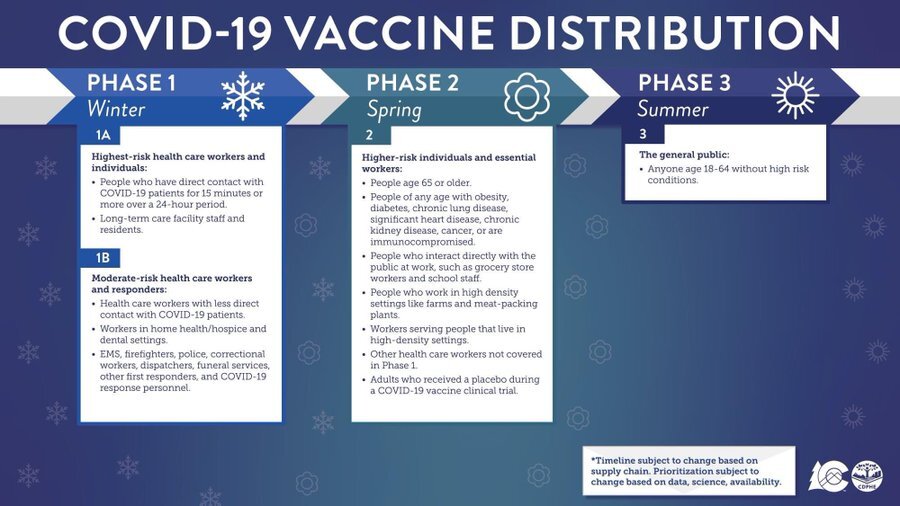Colorado receiving about 17,000 fewer vaccine doses than expected

DENVER — Colorado will receive roughly 17,000 fewer COVID-19 vaccine doses than expected in its next shipment, state officials confirmed to Rocky Mountain PBS.
A spokesperson with the governor’s office said the state had been expecting for the past “several weeks” to receive an allocation of 56,550 Pfizer COVID-19 vaccine doses on Friday, December 18. But earlier this week, plans changed, and now Colorado is receiving about 30% fewer vaccines than anticipated.
“We learned this week that Operation Warp Speed (OWS) leadership has made a decision that changes what we had expected to receive,” said Conor Cahill, a spokesperson for Governor Polis, in an email.
The next shipment will include 39,780 doses, Cahill said. Of those doses, 25,740 will go to the CDC Pharmacy Partnership Program to support vaccinations at nursing homes, and the remaining 14,040 doses will be sent to health care providers.
“OWS is changing their approach so that we get the same allocation each week,” Cahill added. “If additional doses become available, OWS will distribute those additional doses periodically.”
The Associated Press reports the impact is lessened because each vaccine vial contains six doses instead of five, as previously thought. Polis confirmed the report in a press conference on December 18.
The governor also said the federal government needs to do a better job distributing the available vaccines.
"I saw Pfizer's announcement that they have doses in a warehouse and they just need to be told where to send them," Polis said during the press conference. "We say, 'Send them to Colorado.' But we encourage the federal government to get those [doses] distributed out. They're not doing any good in a Pfizer warehouse."
Colorado is not alone in having to adapt to the sudden dip in available vaccines. According to Oregon Public Broadcasting, “the Oregon Health Authority learned that next week’s shipment will total 25,350, down from the 40,950 it had previously been told to expect.”
“We need accurate information to make sure Oregonians are receiving COVID-19 vaccinations as quickly as possible,” Oregon Governor Kate Brown said on Twitter. “This was a federal decision, and I am seeking answers from the CDC about the reliability of the data we are receiving from week-to-week as Oregon builds our vaccine distribution plan.”
In Washington state, Governor Jay Inslee said their vaccine allocation will be cut by 40%. “This is disruptive and frustrating. We need accurate, predictable numbers to plan and ensure on-the-ground success,” he wrote. “No explanation was given.”
The Associated Press reports that several other states also announced significant drops in vaccine shipments: Michigan, Connecticut, Georgia, Illinois, Kansas, Montana, Nebraska, Nevada, New Hampshire and Indiana.
There have been no changes in the number of Moderna COVID-19 vaccine doses planned to arrive in Colorado. The state said they should receive 95,000 doses once the vaccine is authorized for use.
As of December 18 at 10:30 a.m., 16,121 COVID-19 vaccine doses have been administered in Colorado, which began vaccinations on Monday the 14th. The first person to receive a vaccine in Colorado was Kevin Londrigan, a respiratory therapist with UCHealth. Londrigan said the shot didn’t hurt “at all.”
High-risk health care workers are first in line to receive the vaccine as dictated in the state’s three-phase vaccine distribution plan.

Yet there is still some hesitation among health care workers on whether or not to receive the COVID-19 vaccine, which is currently optional. An internal survey from Centura Health, the region's largest network of hospitals, found that just 66% of its health care employees said they would get the vaccine (92% of Centura’s physicians said they would receive the vaccine).
The responses were similar among Denver Health employees. Chief Medical Officer Dr. Connie Price said 70% of Denver Health employees were a “hard yes” when asked if they would receive the vaccine. Price said 20% were still unsure and 10% of employees said they would not take a vaccine.
Nationwide, 61% of Americans say they would get the vaccine, up from just 49% in September, according to the latest PBS Newshour/NPR/Marist Poll.
Rocky Mountain PBS asked the governor’s office and the Colorado Department of Public Health and Environment if the state would require a minimum number of hospital employees to receive the COVID-19 vaccine, similar to how 90% of hospital workers must be vaccinated against the flu each year.
“There are no plans to do that,” a spokesperson for the governor said. “It would be up to the employer and we hope Coloradans step up to get the vaccine.”
